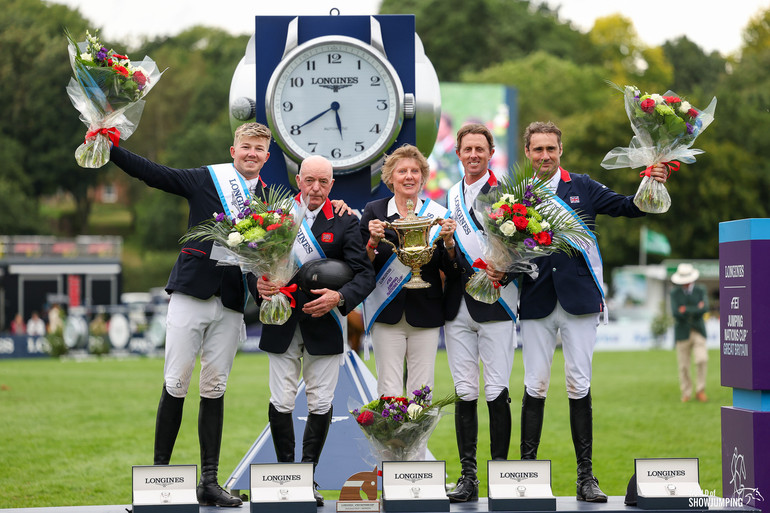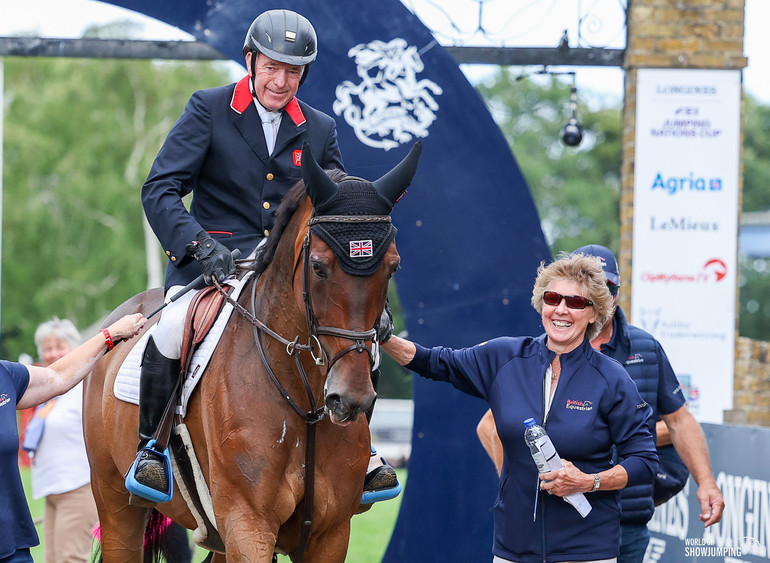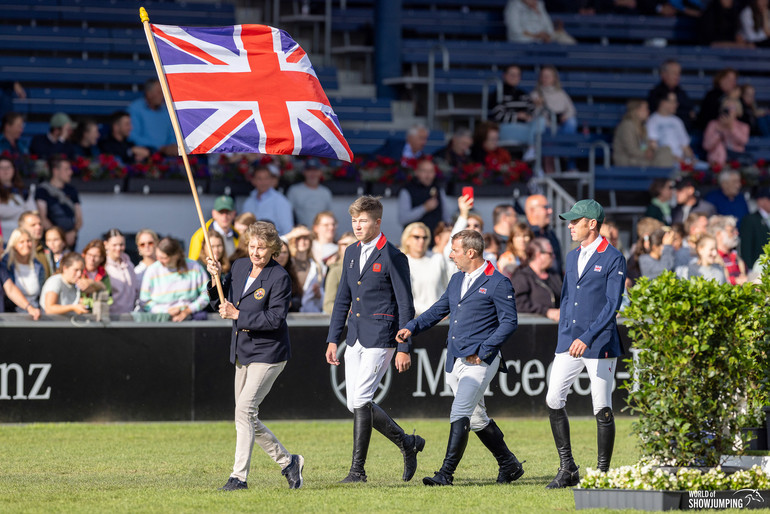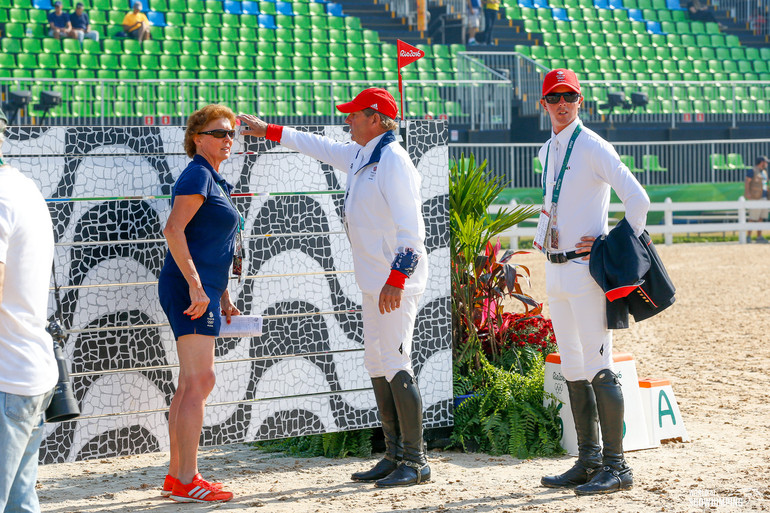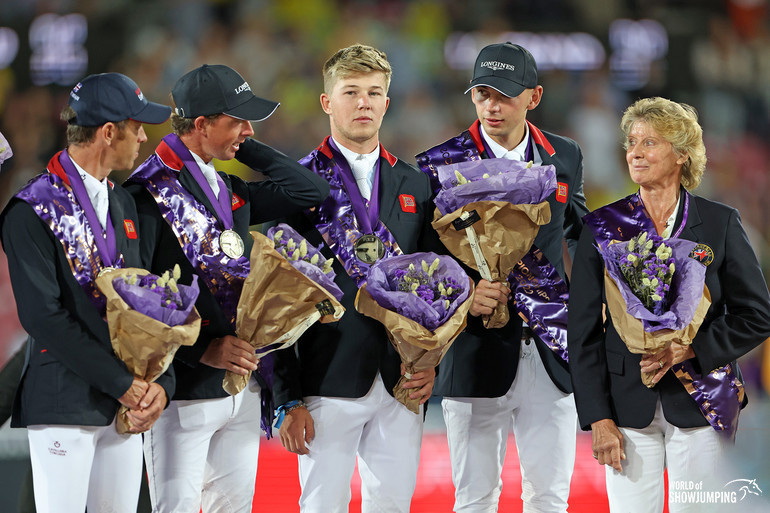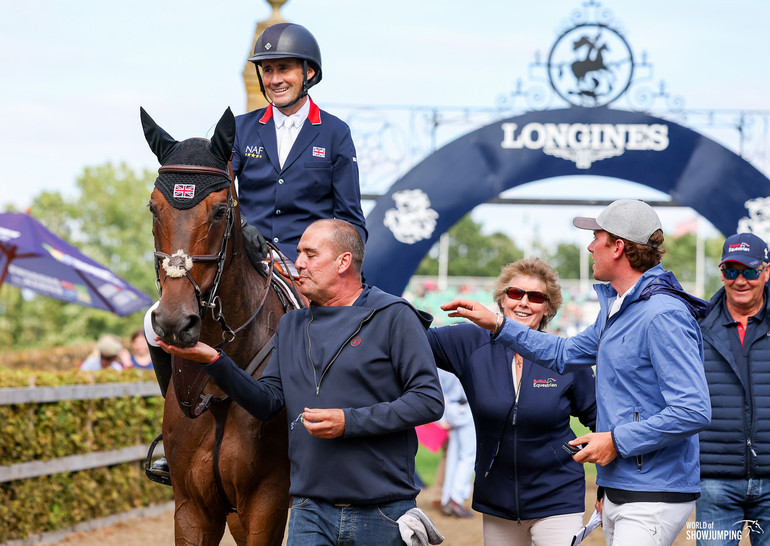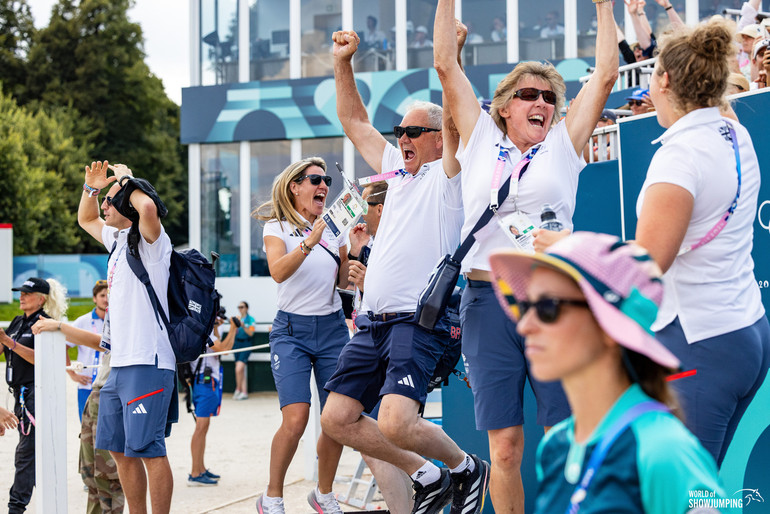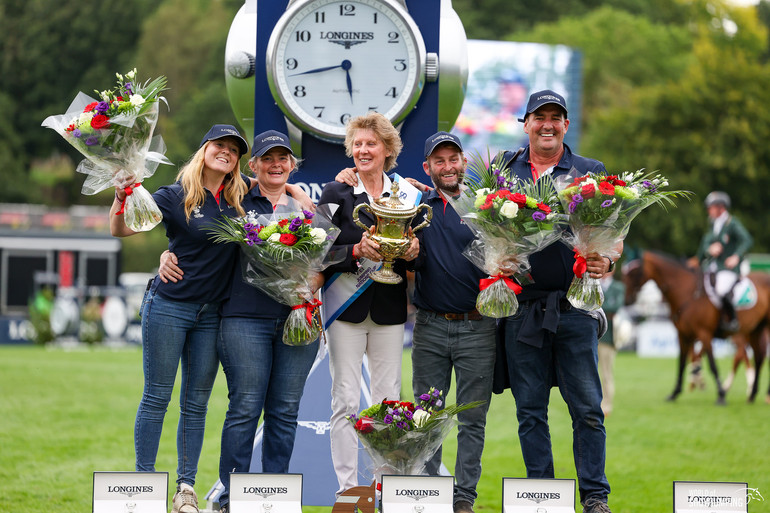Text © World of Showjumping
“I remember coaching Ben Maher and Robert Whitaker at the Le Touquet Pony Europeans in 1998 when we won the team gold medal,“ Di Lampard tells World of Showjumping. “It's nice to have longstanding relationships with the riders to help them in teams and see them flourish. This is really the most rewarding part; to see the partnerships grow and see them all being successful.”
Lampard has worked with the British youth teams since 1996. In 2002, she was appointed consultant head of training at British Showjumping and in 2011 she became a selector for senior teams alongside Rob Hoekstra going into the 2011 European Championships in Madrid and the 2012 Olympic Games in London.
In my experience, it's not all about the coaching at the highest level but rather the small things that make the difference
Lampard progressed in 2015 to the role of Performance Manager for the British Equestrian Federation, as well as chef d’equipe and selector for the senior jumping teams. In June 2017, Lampard was awarded an MBE – the Most Excellent Order of the British Empire – for her services in the field of equestrian sport. During her active riding career, Lampard represented Great Britain at two World Equestrian Games and two European Championships and was part of the Nations Cup team on numerous occasions.
It was under Lampard’s lead that the British team claimed gold at the 2024 Olympic Games, after qualifying on the podium at the 2022 World Championships in Herning. “I believe we've got more consistency now; we've had more podiums at Nations Cup level, and it feels promising going forward,” the 67-year-old says. “I certainly want this as much as the riders do; I have real passion and pride for the flag. Having been a rider myself, I know what it's like to have a good pair of helping eyes on the ground, and the most experienced of riders ask questions to seek perfection. In my experience, it's not all about the coaching at the highest level but rather the small things that make the difference. My past competition career also helps me appreciate the horses, owners and grooms; those who were in my life, and those that now support all of our British riders. I respect and appreciate the owners; our success would not be possible without their support.”
Down the road of horses
“My parents weren't particularly into horses, but they were both from farming backgrounds,” Lampard talks about her upbringing. “It's a little bit typical that I was the daughter that was the animal lover. My parents instilled in me the responsibilities of having animals and they purchased a pony for me and my brother Tim. I found it very frustrating in the early days because it wasn’t’ the most suitable pony that we had; this pony had a will of its own – as they do. Oscar would take me under the apple trees, tip me off under the branches, or lean my leg on the tree, unless I was being led about.”
“However, I had seen the competition aspect because my brother would get this pony to go where he wanted,” Lampard smiles. “My brother tried to tell me that I had to be stricter with the pony, but it wasn’t in my nature at all. Eventually, the pony moved to a more suitable home and my parents booked me in for riding lessons at a well-established riding school. I looked forward to my weekly lessons, which materialized into weekends showing ponies.”
My parents instilled in me the responsibilities of having animals
At the age of 14, Lampard was at a show with the ponies when the excitement of the jumping ring caught her attention. “I remember being bored out of my mind, sitting in the line waiting for my turn to do my show and hearing the noise from the other ring. Later that day, I went over to watch the showjumping and that was the start of it. I liked all sorts of sports when growing up, I was a very athletic child, and my mother wanted me to pursue college and be a physical education teacher. However, I went down the road of the horses – and never looked back. It was a slow process, learning at home by myself making mistakes, this is something I wouldn't advise the youth of today to do. I would advice any young rider to out into a professional yard and get good education from stable management to riding in the ring.”
Leading lady
Lampard went on to have a hugely successful riding career, and for years she was the leading lady rider in Britain. “At the 1998 World Championships in Rome, we won team bronze and that would have to be one of the highlights of my riding career,” she recalls. “I always loved the team events and Nations Cups.”
Alongside competing herself, Lampard did chef d’equipe work for British Showjumping – focusing on the pony teams from 1996 to 1998. In 2008, she took the youth team to the Australian Youth Olympic Games where they won a bronze medal. “Until 2011, I was overseeing the structure, development and coaching of the pony and young rider teams,” she explains.
I always loved the team events and Nations Cups
In 2011, Lampard was approached again by British Showjumping to assist Rob Hoekstra, who at the time was performance manager and chef d’equipe. “I wanted to do that,” she recalls. “I love to learn and it's always great to work with good people. It was good to be present while Rob was coaching and taking those teams forward.”
Eventually, taking the role of the chef d’equipe meant a huge shift in Lampard’s life. “First of all, it was an honour to be asked,” Lampard says. “However, it was a big change for me because we had a good business at home with a lot of coaching and producing nice young horses. With my husband Dietmar Ackermann, we had built Spring Farm in Rutland, the middle of England, with a good coaching facility and accommodation where we could have overseas and national riders. However, I put 100% into everything I do, and I didn't want to carry on the yard at home as I realized I couldn't do that with all the travelling and the commitments. We closed the yard apart from a few of our own horses, and it was quite a sad time to see the yard being emptied. However, the challenge that I was left with was something I so wanted to get on with it.”
On a mission
When Lampard was appointed chef d’equipe, her immediate mission was to get the British team qualified for the 2016 Olympic Games in Rio de Janeiro. “The European Championships at Aachen was our last chance to get qualified,” she recalls. “Aachen alone can be quite a daunting arena which only suits certain types of partnerships. It was very much at the time when our rider squad were changing; we had the more senior riders starting to stand back and we had national and younger riders who weren't quite there yet. It was a big task, and I was very fortunate that we managed to get qualified. In the end, we were nothing off a bronze medal!"
The lesson I came home with was to set my sights high enough in the future
"The lesson I came home with was to set my sights high enough in the future. That was the first hard lesson I learned, because as the horses were jumping and the fourth riders were going into the arena, we knew we had qualified … great! However, we were so close to a bronze medal I should have gone to win, not to qualify – a lesson well learnt. I was obviously over the moon and really relieved to be qualified afterwards. As riders, when we achieve or win a good class, we don't celebrate enough with our support team and owners, we tend to move on to the next challenge. The importance of taking the whole team forward and recognising everyone’s input is paramount in today’s sport.”
“It was amazing to go to Rio and be part of Nick and Big Star’s gold medal,” Lampard talks about the 2016 Olympic Games in Brazil. “This is a sport of two hearts – the rider and the horse – and for that partnership, to come back from injury, the patience and the hard work it took… To witness everything that went into that gold medal was unbelievable. A huge example was shown that hard work and planning is key, there isn’t the need to over-compete experienced partnerships. However, with the team, it was a disappointing performance, and I didn't want to be in that position again.”
Weathering the storms
With the support of the federation during her time at the helm of the British senior jumping team, one big decision that Lampard made was to not attend the 2017 European Championships with a team following the disappointment of the Olympic Games in Rio de Janeiro. “There was such a big void of suitable partnerships,” she recalls. “It was a very tough year and there was a lot of criticism about not sending riders to get experience. It was going to be a difficult decision; I knew I was going to be damned if I did, damned if I didn’t. However, I made the decision because I believe it was time for the country to self-reflect on where we were in the scale of the European and world teams that were taking big strides forwards.”
We weathered the storm, and I think we moved on a lot stronger
"We weathered the storm, and I think we moved on a lot stronger,” Lampard continues. “To me, Herning in 2022 was then again, a great result. Having introduced Joe Stockdale and Harry Charles into the team with Ben Maher and Scott Brash, it was a perfect balance of youth and experience. We were picking up momentum with that bronze medal, it really did us proud.”
“We are introducing and producing new partnerships to what I call the corners of the Nations Cup teams,” Lampard explains about her view. “Nowadays, to win these Nations Cups competitions you do need four good partnerships, because horses aren't machines. You need four good dedicated riders and we are slowly getting stronger as a squad so this will enable us to put competitive teams forward.”
We don't own our riders, and we must make plans that suit our owners, riders and their horses
“Being a manager of a showjumping teams isn't like a lot of people look at it, like managing the England football team – we don't own our athletes. I know the clubs own the football players, but we don't own our riders, and we must make plans that suit our owners, riders and their horses. There is huge prize money and temptations to go to various shows around the world nowadays and horses have been flying around the world for years now, so there are plenty of options. For me, it is about trying to get the riders working together as a team in what is an individual sport.”
“I'm a great believer in giving the younger generation opportunities and this year – like for the past years – we have been providing teams for the Longines EEF Series. We have really gone with the spirit of the competition for the youth of riders or horses, we have selected a lot of young partnerships, and I hope we are encouraging new riders to come forward next year. I hope that we can be even more consistent in the future with what we have been building on.”
En route to Paris
Winning team gold at the 2024 Olympic Games was a personal highlight for Lampard. “It will put a spring in my step for a long time,” she says. “If you want it badly enough, you can make anything happen – that is my mindset in life, and I think the lads proved that true in Paris.”
It was so professional, it wasn’t just winning the gold for me; it was the style they won it
“At the British Equestrian Federation, we work in four-year-cycles, and we are always looking towards the next Olympic Games. Depending on the age of the horses coming into a rider's yard, you can identify what you may have in four-years-time. However, the last two years leading up to the Games are really where it all starts to show the possibilities of a team. However, we all need lots of luck dealing with two hearts getting them on the big stage. Looking at how it all came together in Paris; we had that luck on the day – which anybody needs in any sport. However, I must say that the riders were completely focused, they wanted it so badly, they wanted it for each other. Their planning towards Paris was spot on. That's all I can say, it was so professional, it wasn’t just winning the gold for me; it was the style they won it.”
“I believe our riders went to Paris feeling quietly confident and well supported. I know there were some raised eyebrows when the team was selected. It goes without saying that the team performance in Paris was absolutely world class. Ben, I would not pick anybody else in the world to go out first for me on the team; I am so proud every time I can send Ben out first for a British team. And Harry, talk about an old head on young shoulders, he has been growing into his role. He is a hugely talented young man, and I can see in years to come how he can fulfil whatever role is required. Scott was the horseman for the anchor roll, that last round was absolutely theatre, executed by the coolest rider in the world.”
Keeping the spirit
Something Lampard believes in and tries to create in her team of riders is healthy competition within the squad. “We are fortunate to have the likes of John Whitaker as a regular member of our team,” she points out. “He is a living legend, and he pushes and brings everyone else along. The likes of Joe Stockdale and Tim Gredley have been performing outstanding this year in Nations Cups and Grand Prixs and will be looking at getting back into a championship team next year, along with other good partnerships that are maturing and pushing."
A big help for me is the strong support team that we have built through this programme
"The biggest challenge for a Performance Manager or chef d’equipe is keeping a good spirit and providing the owners, riders and horses with the world class support they require. With the backing of UK Sport and the national lottery funding, the World Class program is there to help their campaign to compete for the flag. A big help for me is the strong support team that we have built through this programme; vet Tim Randle, equine and human physiotherapists Rachel Greetham and Jennie Owst, and owner liaison Tina Goosen, who is my right hand and most instrumental for me. The last couple of seasons has seen the appointment of our technical advisor Stanny Van Paesschen. He has been a great help to me. He is a true gentleman that I can bounce ideas off and also checks and challenges me on decisions. Stanny, the horseman he is, is at hand at the shows to support the riders. Of course none of this would happen without the support from British Showjumping and Jess Krusin from the performance department that works in the background making entries and sending videos to team riders.”
“To me, being able to produce your horses with patience and then perform on a given day is what it’s all about – the latter is what I base our selection policy on,” Lampard continues. “It isn't about the more you jump, the more you win, or the number of horses you have, it’s more about the quality than the quantity. I am old-fashioned and I love to see horses produced properly and horses enjoying what they are doing. This is the number one for me and why I’m in this sport. I have a close connection to many of my riders' horses, I spend a lot of time in the stables at shows and notice the wonderful care and detail to the horse’s welfare. I like to see the horses' different characters and speak to the grooms, getting to meet the whole team around the horses. I believe it can help make selections and influence new members.”
I am old-fashioned and I love to see horses produced properly and horses enjoying what they are doing
“As I'm thinking about the future and British showjumping, it's looking bright with the talented riders we have,” Lampard concludes. “I think the sport is evolving in a great way and it is a pleasure to be part of this. I want to play my part and help anywhere I can. I firmly believe British riders are picking up momentum, the Nations Cup have always been my favourite competitions in fact the dual in the crown. For many years these shows have been a stepping stone for talented riders to the top of our sport.”
29.10.2024 No reproduction of any of the content in this article will be accepted without a written permission, all rights reserved © World of Showjumping.com. If copyright violations occur, a penalty fee will apply.



